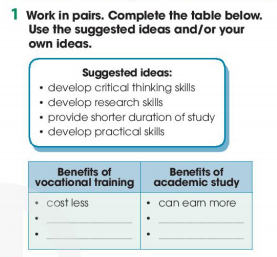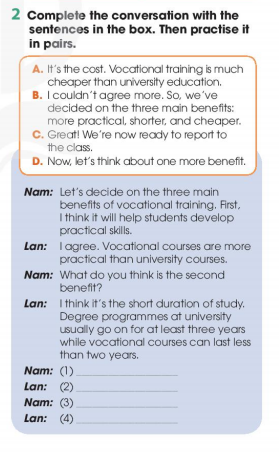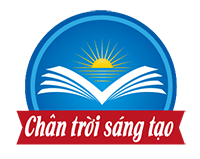Tiếng Anh 11 Global Success Unit 7 Speaking
Tiếng Anh 11 Unit 7 Speaking
Nằm trong bộ tài liệu Giải tiếng Anh 11 Kết nối tri thức theo từng Unit, Soạn tiếng Anh 11 Unit 7 Speaking giúp các em chuẩn bị bài tập SGK tiếng Anh hiệu quả.
Vocational training vs. academic study
(Đào tạo nghề và nghiên cứu học thuật)
1. Work in pairs. Complete the table below. Use the suggested ideas and / or your own ideas.
(Làm việc theo cặp. Hoàn thành bảng dưới đây. Sử dụng các ý tưởng gợi ý và/ hoặc ý tưởng của riêng bạn.)

Gợi ý đáp án
|
Benefits of vocational training |
Benefits of academic study |
|
- cost less (chi phí ít hơn) - develop practical skills (phát triển kỹ năng thực tế) - shorter duration of study (thời gian học ngắn hơn) - opportunities for immediate employment (cơ hội có việc làm ngay) - hands-on learning experience (trải nghiệm học tập thực tế) - focuse on job-specific skills (tập trung vào các kỹ năng cụ thể của công việc) - opportunities for on-the-job training (cơ hội được đào tạo trong công việc) - directly applicable to specific occupations (áp dụng trực tiếp cho các ngành nghề cụ thể) - less theory, more practical application (lý thuyết ít hơn, ứng dụng thực tế hơn) - promote teamwork and collaboration (thúc đẩy tinh thần đồng đội và hợp tác) |
- can earn more (có thể kiếm nhiều hơn) - develop critical thinking skills (phát triển kỹ năng tư duy phản biện) - develop research skills (phát triển kỹ năng nghiên cứu) - access to a wider range of career paths (tiếp cận với nhiều con đường sự nghiệp hơn) - opportunities for academic research (cơ hội nghiên cứu học thuật) - provide a broader education (cung cấp một nền giáo dục rộng lớn hơn) - opportunity to pursue advanced degrees (cơ hội theo đuổi bằng cấp cao) - develops a range of transferable skills (phát triển một loạt các kỹ năng chuyển nhượng) - enhances personal and intellectual growth (tăng cường phát triển cá nhân và trí tuệ) - builds a strong foundation for future learning (xây dựng nền tảng vững chắc cho việc học tập trong tương lai) |
2. Complete the conversation with the sentences In the box. Then practise it in pairs.
(Hoàn thành đoạn hội thoại với những câu trong khung. Sau đó thực hành nó theo cặp.)

Gợi ý đáp án
|
1. D |
2. A |
3. B |
4. C |
Lời giải chi tiết
Nam: Let’s decide on the three main benefits of vocational training. First, I think it will help students develop practical skills.
(Hãy quyết định ba lợi ích chính của đào tạo nghề. Thứ nhất, tôi nghĩ nó sẽ giúp sinh viên phát triển các kỹ năng thực tế.)
Lan: I agree. Vocational courses are more practical than university courses.
(Tôi đồng ý. Các khóa học nghề thực tế hơn các khóa học đại học.)
Nam: What do you think is the second benefit?
(Bạn nghĩ lợi ích thứ hai là gì?)
Lan: I think it’s the short duration of study. Degree programmes at university usually go on for at least three years while vocational courses can last less than two years.
(Tôi nghĩ đó là thời gian học ngắn. Các chương trình cấp bằng tại trường đại học thường kéo dài ít nhất ba năm trong khi các khóa học nghề có thể kéo dài dưới hai năm.)
Nam: (1) D. Now, let's think about one more benefit.
(Bây giờ, hãy nghĩ về một lợi ích nữa.)
Lan: (2) A. It’s the cost. Vocational training is much cheaper than university education.
(Đó là chi phí. Đào tạo nghề rẻ hơn nhiều so với giáo dục đại học.)
Nam: (3) B. I couldn‘t agree more. So, we’ve decided on the three main benefits: more practical, shorter, and cheaper.
(Tôi không thể đồng ý hơn. Vì vậy, chúng tôi đã quyết định về ba lợi ích chính: thiết thực hơn, ngắn hơn và rẻ hơn.)
Lan: (4) C. Great! We're now ready to report to the class.
(Tuyệt vời! Bây giờ chúng ta đã sẵn sàng để báo cáo trước lớp.)
3. Work in pairs. Talk about the benefits of academic study. Use the ideas in 1, the model in 2, and the tips above to help you.
(Làm việc theo cặp. Nói về lợi ích của việc học tập. Sử dụng các ý tưởng trong phần 1, mô hình trong phần 2 và các mẹo ở trên để giúp bạn.)
Gợi ý đáp án
A: I think one of the main benefits of academic study is that it develops critical thinking skills.
B: Yes, I agree. Academic study involves a lot of analysis, evaluation, and interpretation of information, which helps students become more critical thinkers.
A: Another benefit is that it provides a broader education. While vocational training focuses on job-specific skills, academic study covers a wide range of subjects, including humanities, social sciences, and natural sciences.
B: That's true. And having a broader education can help students develop a range of transferable skills that can be applied in different fields.
A: Lastly, academic study provides an opportunity to pursue advanced degrees, which can lead to better job opportunities and higher earnings in the long run.
B: Absolutely. And pursuing an advanced degree can also help students specialize in a specific area of interest and gain expertise in their chosen field.
A: So, to sum up, the three main benefits of academic study are developing critical thinking skills, providing a broader education, and offering opportunities for advanced degrees.
B: Great! We're now ready to report to the class.
Hướng dẫn dịch
A: Tôi nghĩ một trong những lợi ích chính của việc học tập là nó phát triển các kỹ năng tư duy phản biện.
B: Vâng, tôi đồng ý. Nghiên cứu học thuật liên quan đến rất nhiều phân tích, đánh giá và giải thích thông tin, giúp học sinh trở thành những người có tư duy phê phán hơn.
A: Một lợi ích khác là nó cung cấp một nền giáo dục rộng hơn. Trong khi đào tạo nghề tập trung vào các kỹ năng cụ thể của công việc, nghiên cứu học thuật bao gồm nhiều môn học, bao gồm nhân văn, khoa học xã hội và khoa học tự nhiên.
B: Đúng vậy. Và có một nền giáo dục rộng hơn có thể giúp học sinh phát triển một loạt các kỹ năng có thể chuyển đổi có thể được áp dụng trong các lĩnh vực khác nhau.
A: Cuối cùng, nghiên cứu học thuật tạo cơ hội để theo đuổi bằng cấp cao, điều này có thể dẫn đến cơ hội việc làm tốt hơn và thu nhập cao hơn trong thời gian dài.
B: Chắc chắn rồi. Và theo đuổi bằng cấp cao cũng có thể giúp sinh viên chuyên môn hóa trong một lĩnh vực cụ thể mà họ quan tâm và đạt được kiến thức chuyên môn trong lĩnh vực họ đã chọn.
A: Tóm lại, ba lợi ích chính của việc học tập là phát triển các kỹ năng tư duy phản biện, cung cấp một nền giáo dục rộng lớn hơn và tạo cơ hội cho các bằng cấp cao.
B: Tuyệt vời! Bây giờ chúng ta đã sẵn sàng để báo cáo trước lớp.
4. Work in groups. Discuss what kind of students / learners each option will be more suitable for. Give reasons for your decision. Report to the whole class.
(Làm việc nhóm. Thảo luận xem mỗi phương án sẽ phù hợp hơn với đối tượng học sinh/người học nào. Đưa ra lý do cho quyết định của bạn. Báo cáo với cả lớp.)
Gợi ý đáp án
Option 1: Vocational Training
Suitable for: Students who prefer hands-on learning and practical application of skills. Vocational training is more focused on job-specific skills and can provide opportunities for immediate employment. This option is also suitable for students who are looking for shorter duration of study and want to save on the cost of education.
Option 2: Academic Study
Suitable for: Students who are interested in a broad range of subjects and want to develop critical thinking and research skills. Academic study provides a wider range of career paths and opportunities for pursuing advanced degrees. It also promotes personal and intellectual growth and helps build a strong foundation for future learning.
Ultimately, the choice between vocational training and academic study depends on the individual student's interests, goals, and learning preferences. Some students may find vocational training more suitable for their career goals, while others may prefer the broader education and research opportunities offered by academic study.
Hướng dẫn dịch
Phương án 1: Đào tạo nghề
Thích hợp cho: Học sinh thích học thực hành và áp dụng các kỹ năng vào thực tế. Đào tạo nghề tập trung nhiều hơn vào các kỹ năng cụ thể của công việc và có thể tạo cơ hội có việc làm ngay. Tùy chọn này cũng phù hợp với những sinh viên đang tìm kiếm thời gian học ngắn hơn và muốn tiết kiệm chi phí giáo dục.
Phương án 2: Học thuật
Thích hợp cho: Những sinh viên quan tâm đến nhiều môn học và muốn phát triển tư duy phản biện và kỹ năng nghiên cứu. Nghiên cứu học thuật cung cấp một loạt các con đường sự nghiệp và cơ hội để theo đuổi bằng cấp cao. Nó cũng thúc đẩy sự phát triển cá nhân và trí tuệ, đồng thời giúp xây dựng một nền tảng vững chắc cho việc học tập trong tương lai.
Cuối cùng, sự lựa chọn giữa đào tạo nghề và nghiên cứu học thuật phụ thuộc vào sở thích, mục tiêu và sở thích học tập của từng học sinh. Một số sinh viên có thể thấy đào tạo nghề phù hợp hơn với mục tiêu nghề nghiệp của họ, trong khi những sinh viên khác có thể thích các cơ hội học tập và nghiên cứu rộng hơn do nghiên cứu học thuật mang lại.
Trên đây là Soạn tiếng Anh 11 Global Success Unit 7 Speaking đầy đủ nhất.








